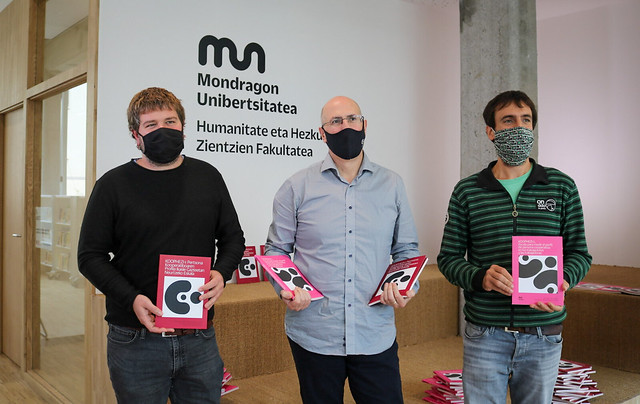The Faculty of Humanities and Education Sciences has published two books proposing scales to measure the profile of the cooperative individual
The Faculty of Humanities and Education Sciences has published two books proposing scales to measure the profile of the cooperative individual
The Faculty of Humanities and Education Sciences has published two books proposing scales to measure the profile of the cooperative individual
The books include two scales to measure the profile of the cooperative individual in student youth and workers.

On October 7, researchers from the Faculty of Humanities and Education Sciences of Mondragon University presented two publications in an event that took place on the Eskoriatza campus. These studies will serve to measure the cooperative profile of two groups of people: student youth and workers. Three researchers from the Faculty participated in the presentation: Jose Ramon Vitoria, coordinator of the KOOPHEZI project, and two representatives of the authors: Oxel Azkarate-Iturbe (cooperative profile of students aged 16 to 22) and Ion Lezeta (cooperative profile of workers aged 23 and older).
Two products of the KOOPHEZI research project
The researchers believe that there is a need for “cooperative individuals” to meet the social challenges of the 21st century and that it is necessary to nurture the work context of the profile of the cooperative individual in different spheres of the community. New times require new solutions and in this respect, we need people who are qualified and trained to respond to the challenges of today’s complex society.
In order to respond to the challenges of future society, the primary purposes of the KOOPHEZI study are to create a database of advanced research tools for the identification and development of cooperative individuals in educational institutions and companies, and to adapt those tools as necessary.
This study has made it possible for researchers to define the “cooperative individual” and to create two different tools to measure the profiles of individuals with the relevant characteristics. The results of the study have been published in two books: KOOPHEZI-i: Pertsona kooperatiboaren profila ikasle gazteetan neurtzeko eskala (KOOPHEZI-i: A scale to measure the profile of the cooperative individual in student youth) and KOOPHEZI-L: Pertsona kooperatiboaren profila langileetan neurtzeko eskala (KOOPHEZI-L: A scale to measure the profile of the cooperative individual in workers.
KOOPHEZI-i: A scale to measure the profile of the cooperative individual in student youth
The authors of this book are Oxel Azkarate-Iturbe, Ion Lezeta, Jose Ramon Vitoria, Iban Galletebeitia, Ane Sanchez and Miren Zubizarreta from Mondragon University, and Aitor Aritzeta from the University of the Basque Country. The book was written under the guidance of researchers from the Faculty of Humanities and Education Sciences but the researchers mentioned above also took part, in collaboration with schools and faculties from different networks in Gipuzkoa.
Researcher and study coordinator Oxel Azkarate-Iturbe states that “the purpose of the work is to fill a gap identified in the transformation processes initiated by educational centers and university faculties: the need to evaluate/measure a profile, whether of a person or student, that matches the mission of the institutions; specifically, to measure the profile of the cooperative individual.” The authors believe that the KOOPHEZI-i tool is applicable at the high school level as well as in vocational training and in university degree programs.
KOOPHEZI-L: A scale to measure the profile of the cooperative individual in workers
Mondragon University researchers Ion Lezeta, Oxel Azkarate-Iturbe and Jose Ramon Vitoria, and University of the Basque Country researcher Aitor Aritzeta are the authors of this study, which addresses the sphere of workers.
Ion Lezeta states that “the qualified worker is the most direct source of value. The autonomous worker, but one who is able to share knowledge and create with others, a worker who knows how to join a common project.” Furthermore, says Lezeta, “the participating company must promote the human skills that every citizen needs: participation, initiative, teamwork, creativity, self-esteem, reasoning, interdependence, responsibility, social values…” All of these form part of the “profile of the cooperative individual” that this tool will help to measure.
The tool that measures the cooperative worker profile has been published in both Basque and Spanish.
- KOOPHEZI-i: Pertsona kooperatiboaren profila ikasle gazteetan neurtzeko eskala. (eus) (PDF)
- KOOPHEZI-L: Pertsona kooperatiboaren profila langileetan neurtzeko eskala. (eus) (PDF)
- KOOPHEZI-L: Escala para medir el perfil de persona cooperativa en los trabajadores y las trabajadoras. (esp) (PDF)
Contributors and participants
The researchers would like to thank the Provincial Council of Gipuzkoa, the Gizabidea Foundation, the ULMA Foundation, Mondragon University, and the Faculty of Humanities and Education Sciences for their assistance in and support of this project and the creation of these tools. In addition, they would like to thank all the companies and organizations that opened their doors to allow the essential applications to be done in order to analyze the psychometric characteristics of the test; they also thank all the students and workers who responded to this tool.
Photo, from left to right: Oxel Azkarate-Iturbe, Jose Ramon Vitoria and Ion Lezeta.
Photo gallery:

